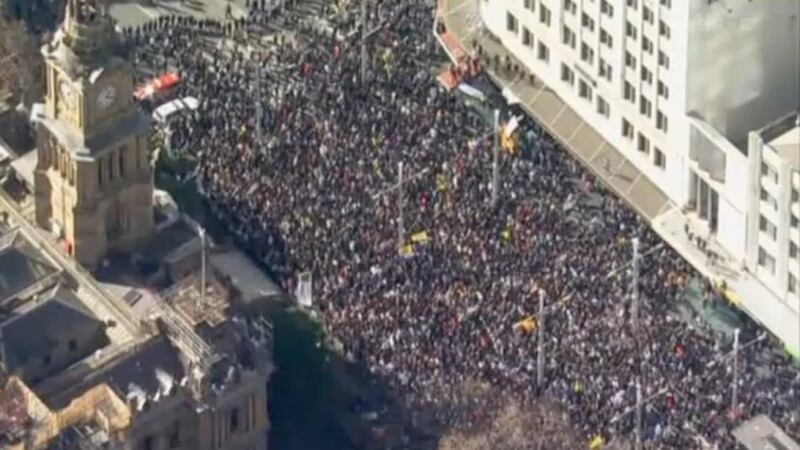Story produced by Hannah Bodger Kearns in Aria.
Damian tears up when talking about missing his dad’s tangihanga after the NSW Covid-19 outbreak saw the trans-Tasman bubble burst with Australia.
“We haven't been home for two years now…It's a big mental strain, a stress on all of us not being able to get home and be with whānau.”
Two weeks ago, the Kiwi was in the thick of the 'Freedom Day' lockdown protests in Sydney’s CBD that saw chaotic scenes and 63 people arrested. The event coincided with NSW Premier Gladys Berejiklian's extension to the state's then month-long lockdown.
“What you saw on television was nothing compared to what it was on the day, it was peaceful," says Damian. “Yeah, people were passionate, there were drums banging, people were clapping, people were chanting, but that’s a protest.”
Sydneysiders enter their sixth week of lockdown today after an unmasked, unvaccinated limousine driver triggered a Covid-19 outbreak of the highly contagious Delta strain.
The outbreak has spread to more than 4000 people and claimed five lives yesterday alone. Damian says despite police handing out dozens of fines and the possibility of a prison sentence hanging over his head, he would do it again.
“I probably would, yup. You're at a loss. You don't know what to do. It's the public making the major sacrifices. And these guys [government officials] can't give us a road plan. They can't give us a map out of here.”
A construction worker, on the face of it he is by no means your career protestor. He has a wife and kids at home. Until last week, those locked down were receiving just $600 government support each week (it has since gone up to $750). He says his reasons for attending were predominantly centred on economics and mental health.
“$600 bucks doesn't cut it. There’s businesses shutting down. I was supposed to start work two weeks ago and they shut construction down, which is new for New South Wales lockdowns. The suicide rate, I mean, I think the last number I saw was like 1500 people losing to suicide, mental illness. Kids can't go to school. They talk about essential workers. It's essential that I work to provide for my family. And so I think I'm an essential worker, is that not being essential to my family?”
Damian is hugely critical of the regional containment lockdowns for areas where the virus is spreading most rapidly. He says they unfairly target the poorer areas in Sydney’s west and south-west.
“If I was to walk down to Bondi Beach right now, you would not think there's a lockdown. If I was to go to Coogee Beach, Maroubra Beach, you wouldn't think this [was] lockdown, quite privileged in this area. But out west, they're feeling it. It's major.
Aussie PM Scott Morrison has called the protestors reckless and selfish, while New South Wales officials branded them ‘boofheads’, saying they fear the march could have served as a super spreader event.
Even Māori Party co-leader Debbie Ngarewa-Packer labelled a haka performed at the event disheartening.
"When we are using our tikanga, when we are using our haka, our karanga to find kaha to take on something, that's always about staying alive and thriving. It was never about someone else's whenua. It's about how are the tangata moemoea are going to be affected by this pandemic." Ngarewa-Packer said at the time.
Damian’s branded the Australian officials hypocrites.
“There were people wearing masks. Probably not as many as the authorities would have liked. But that was what it was, you know. People aren't happy, they’re frustrated. Let's compare it to Black Lives Matter last year, which was in the middle of a lockdown. That was ‘a-okay’, that was all good. Fast forward to now, "Oh, it's gonna be a super spreader event. You're so selfish. You're so this, you're so that.” It's like pick and choosing, you know, that's not fair at all.”
Damian says the federal and NSW government is deflecting from a slow vaccine rollout that saw the (publically) less desirable AstraZeneca vaccine (linked to blood clots in a small number of people), purchased by the federal government, over Pfizer (the vaccine secured by the NZ government).
“Me and my wife we're not anti-vaxxers, but we're pro-choice. We've all had vaccines, I’ve had 12 or 13 vaccines and I'm okay. I think that was the major feeling that I got at the protest, that everyone was pro-choice.
Australian officials and the World Health Organisation warn the benefits of the AstraZeneca vaccine far outweigh the risk of acquiring Covid-19 unvaccinated. A blood clot risk is less than 2.7 people per 100,000. While the mortality rate of Covid-19 in Australia is 2.6%, some 2600 people per 100,000.
Damian feels information from government officials and media surrounding the vaccine has been incomplete and argues that is what feeds the scepticism by those at the march.
“What limited information the media does pass on, and it's very limited. I mean, the push is just get vaccinated. Blood clots and all the rest of it.”
Damian does hold out hope things will get better. This week he’ll be back to work after the NSW government lifted the ban on construction.
He is not confident though that Premier Berejiklian, who just granted NSW employees a 2.5% pay rise amid lockdown and herself receives some $407,980 (AUD), will be the one to turn things around in the long term.
“They're getting pay rises. You know what I mean? We've had three lockdowns here in Sydney, there's been five lockdowns down in Victoria yet they're still playing it week by week. Barijiklian said yesterday a recipe for freedoms… is restrictions and vaccinations. Well, that's quite scary. You know. We're talking about recipes. It's nothing that I would want to cook up.”

